Casa Cuna is a free-of-charge childcare center in Puebla, Mexico serving young children from poor and dysfunctional families. Continue reading
Category Archives: Children and Families
Anisha Kitchen Gardens
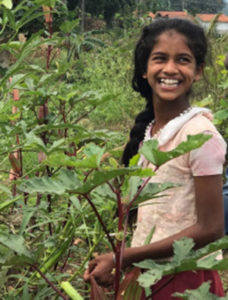 In the rural area of southern India where Anisha is located, marginalized farmers and landless families, often headed by single women, struggle to meet their most basic needs. Approximately 70% of these people are members of the lowest social caste in India and their children often lack adequate nutrition and health care. Without extra support, many of these children drop out of school and become trapped in the child labor sector of the local mining industry.
In the rural area of southern India where Anisha is located, marginalized farmers and landless families, often headed by single women, struggle to meet their most basic needs. Approximately 70% of these people are members of the lowest social caste in India and their children often lack adequate nutrition and health care. Without extra support, many of these children drop out of school and become trapped in the child labor sector of the local mining industry.
These families suffer from the results of the Green Revolution of the early 1960s in India. Farmers were encouraged to adopt the use of commercial fertilizers and pesticides, as well as non-native seeds. Soils were depleted across India and many farmers were forced to leave their homelands for slums in India’s major cities.
Susila Dharma USA is proud and happy to report that Anisha has received the second year of funding for its Kitchen Garden Project from the Guru Krupa Foundation based in New York state. The Foundation has given another grant of $10,000.00 to Anisha this year (2017/2018) to continue its four-year educational project to teach over 1400 middle school students to grow organic kitchen gardens at their homes. These students live in the Martalli Region of Karnataka State in Southern India. Their families struggle every day with extreme poverty and everything that results from it. They live in a drought-prone area that is also hard-hit by the effects of climate change. Learning to grow small-scale kitchen gardens producing organic vegetables grown from native seeds (initially supplied by Anisha’s own native seed bank) can make a significant difference in improving the standard of living in this area. It can help to stem the flow of farming families that are forced to abandon their homes in India’s countryside and move into the dumping grounds of India’s big city slums.
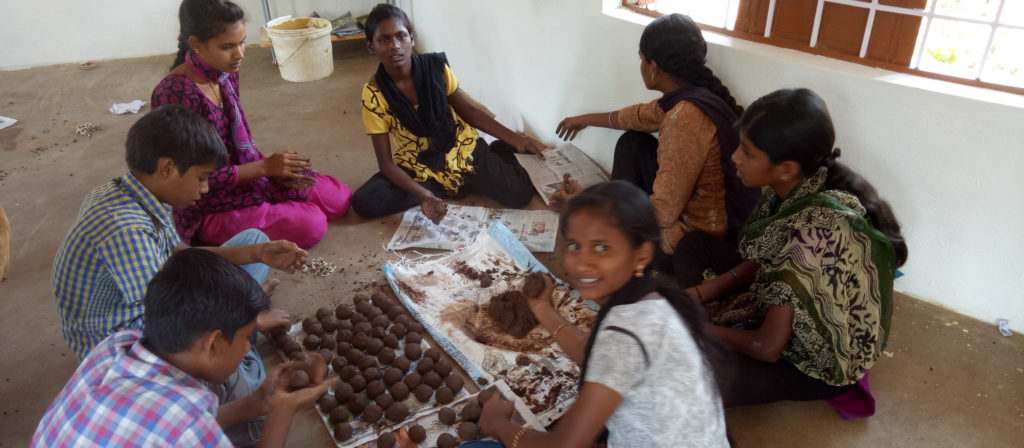
Youngsters at Anisha make “seed balls” out of cow dung and other ingredients. These balls protect the seedlings and give them a headstart with important nutrients.
We are so appreciative of the support provided by the Guru Krupa Foundation to help Anisha do its vitally important work! Please visit their website to learn about their impressive work in both the United States and India – www.guru-krupa.org.
- Learn more about the Guru Krupa Foundation: www.guru-krupa.org
- Learn more about Anisha
Borneo International Football Academy
Borneo Football International Academy provides a healthy environment and quality assistance to children and youth in football training, health promotion and nutrition, school support and basic English education.
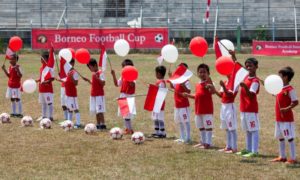 Borneo, or Kalimantan, as it is called in Indonesia, is a land in a state of conflict and transition. The native peoples are various Dayak subcultures, but 30% of the population is of Chinese descent and, in the last 20 years, the Indonesian government has undertaken an intense transmigration program, finacing the relocation of poor, landless families from Java, Madura, and Bali. Transmigrants make up 21% of the population in Central Kalimantan. Feelings of resentment between cultural groups can run very high and violence has, more than once, erupted as imigrants, gold mining, and lumber interestests encroach on native lands, with thousands of people killed.
Borneo, or Kalimantan, as it is called in Indonesia, is a land in a state of conflict and transition. The native peoples are various Dayak subcultures, but 30% of the population is of Chinese descent and, in the last 20 years, the Indonesian government has undertaken an intense transmigration program, finacing the relocation of poor, landless families from Java, Madura, and Bali. Transmigrants make up 21% of the population in Central Kalimantan. Feelings of resentment between cultural groups can run very high and violence has, more than once, erupted as imigrants, gold mining, and lumber interestests encroach on native lands, with thousands of people killed.
It has long been known that to address racial and cultural hatred, predjudice and conflict, you must work with young people. The young are still developing their understanding of the world and are most open to change. Also when young people can bring new ideas home to their families, often leading to a change in outlook among the older generation, too.
Borneo Football International Academy (BFIA) is the vehicle of Borneo Football International Foundation’s integrated programme for assisting children and youth’s healthy development through football. It provides a healthy environment and quality assistance to children and youth in football training, health promotion and nutrition, school support and basic English education. At the same time, the Academy promotes multicultural tolerance and integration
BFIA has currently reached the landmark of 100 students aged 7 to 18 from various backgrounds and religions. Amongst them there are Dayaks, Javanese, Balinese, Christians, Mulisms, Hindus and Buddhists.
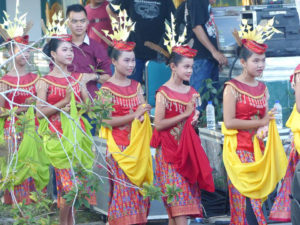
Opening Ceremony / Yayasan Usaha Mulia – Dayak Dance Group — with Imanuel Yeremia, Yusvita Intarini, Fitri Moni Lestari, MuUtd, Rustiani Tambunan and Yeyen Andreyani Eka Rajaki.
Being the only academy of its kind in the region, BFIA has already drawn the attention of surrounding communities and local governement institutions who have, in turn, supported the launching of the first Borneo Football Cup 2015, a grand event held at the Palangkaraya Stadium during the month of August.
BFIA has currently reached the landmark of 100 students aged 7 to 18 from various backgrounds and religions. Amongst them there are Dayaks, Javanese, Balinese, Christians, Mulisms, Hindus and Buddhists.
The Football Academy is funded and managed by Borneo Football International Foundation, a non-profit organization registered with the government of Central Kalimantan.
Contact:
Muhammad Bachrun Bustillo, Chairman.
Rungan Sari,
Jl. Cilik Riwut Km 36,
Palangkaraya 73225,
Central Kalimantan,
Indonesia
Email: borneo.football@gmail.com
You can follow BFIA on their Facebook page
and on Twitter and Instagram: @borneo_football
A Child’s Garden of Peace
Read Illène Pevec’s new book,
Growing a life: Teen Gardeners Harvest Food, Joy, and Life!
You can also follow it on Facebook.
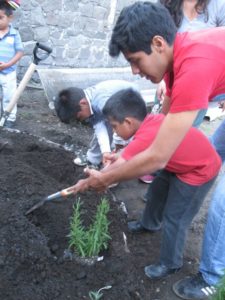
A Child’s Garden of Peace is a collaborative effort founded and directed by Dr. Illène Pevec to create gardens where children can play in peace and learn to grow food for themselves and their families. ACGP acts always in collaboration with other educational entities and foundations. This is the story of how it began and how it operates.
Continue reading
